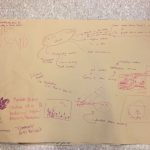Students will be engaged in a variety of project-based learning activities that will promote the celebration of Canada’s 150th. Using a project-based learning method, students will plan and execute a variety of student-lead projects in conjunction with community partners to commemorate Canada’s 150 years as a country.
Team Members
Mary Maurice
Algoma District School Board
Gina D'Ulisse
Algoma District School Board
Dan Sauve
Algoma District School Board
Marco Bernabucci
Algoma District School Board
Kevin Magill
Algoma District School Board
Professional Learning Goals
- A better understanding of project-based learning as we had needed to have time to better understand the roll-out process, implementation and final presentation of projects. We had needed to have time together to build community partnerships and reflect on the practices we intended to implement when using the project-based learning method.
- Used more technology in order to spread the learning beyond the classroom walls
- Incorporated community partners into our learning and made the learning more relevant to the students
Activities and Resources
The team took part in numerous professional development sessions on project-based learning. They also were a part of a technology-based session that showed them how to infuse technology into project-based learning. Our theme was Canada 150 and the team, along with their students, organized and participated in many projects around the school and the community. Some of these projects included the city’s Canada 150 mosaic (http://canada150mosaic.com/sault-st-marie/), Rendezvous Days, Canadian Citizenship Ceremony, Canada 150 Fashion Show, a civics trip, and a welcoming dinner for Syrian refugees. The students and teachers learned how to move the project beyond the classroom, a prerequisite of project-based learning. Students, along with their teacher mentor, wrote three grant proposals to find funding for the planting of 150 trees, each representing a year in Canadian history. The trees were to hold the history of Canada and our local history on a QR code. Unfortunately, the teams were unsuccessful in obtaining money to proceed with the project. However, the learning that took place was phenomenal.
Unexpected Challenges
There were many different challenges along the way. At first, we thought we all had to be together to address the project goals. We later realized that once we all had a basic understanding of project-based learning, it was better to try the ideas than just discuss them. We also found that we did not have to all work together, but small pairings of teachers were more effective in achieving our goals and spreading the vision of project-based learning pedagogy. As a result, we did not have many large-scale meeting days, instead we met together in small groups.
Enhancing Student Learning and Development
The student learning was enhanced throughout the process through the inclusion of grant writing skills. Students and teachers were taught basic grant writing through a workshop put on by the curator of the Ermatinger Old Stone House. The curator also provided a workshop on curating, which demonstrates how exhibits are set up. Our connections with the local historical sites, the city of Sault Ste. Marie and the Ministry of Citizenship and Immigration served to deepen the learning and enhanced student engagement as they saw a real-world purpose for the projects.
Sharing
We have throughout the year shared our projects and learnings with fellow staff members through our Webinar Wednesday professional development lunches. In this forum, we have shared our organization, garnered constructive feedback and made new community partnerships. Along with Webinar Wednesdays, we shared our information through our Monday morning standup meetings, professional days and though the media. We also have a collaborative sharing space on Office 365, where staff has access to our handouts, videos and multimedia presentations.
Project Evaluation
Our project was successful as it helped our teachers get a better understanding of project-based learning. It served to allow teachers to have the time to understand the pedagogy and try it out with their classes in collaboration with their colleagues. Based on the number of projects and the amount of time spent together discussing and collaborating on projects, we believe we met our goals.
Resources Created
These resources will open in your browser in a new tab, or be downloaded to your computer.





